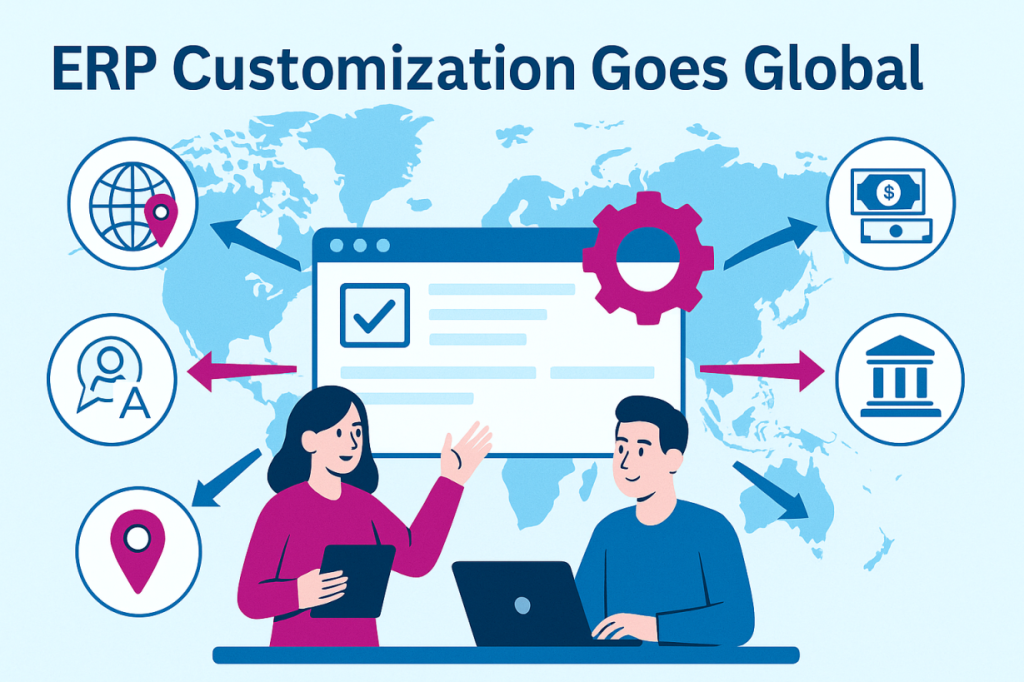
Making ERP Systems Work for the Majority of the World (and Why They Mostly Didn’t, Until Now)
Enterprise software, particularly ERP (Enterprise Resource Planning) systems, is often presented as the backbone of modern business. For large corporations in North America or Europe, these systems promise integrated workflows, financial clarity, and process optimization.
But what’s often overlooked—especially in the realm of international development—is that most ERP systems are built with the assumptions of English-speaking, Western business environments baked into their very foundations.
The result? Organizations and entrepreneurs across the Global South are asked to fit their workflows, their languages, and their business realities into tools that were never designed for them.
It’s a quiet kind of digital colonialism.
US English Is the Default. But That’s a Problem.
The overwhelming majority of mainstream ERP tools are English-first or English-only. Even when translated, the software often retains:
- English-centric terminology (“Accounts Payable” vs. local terms)
- Western fiscal calendars
- U.S.-style tax structures and reporting formats
- UI/UX conventions built around North American workflows
This creates serious friction in non-English contexts—from confusion in basic navigation, to errors in compliance reporting, to cultural mismatches in how processes like payroll, vendor management, or procurement are handled.
A “One-Size-Fits-All” Model Doesn’t Fit Global Realities
Most commercial ERP systems assume certain business norms:
- Formalized supply chains
- Centralized management structures
- Consistent internet access
- Uniform accounting standards
- Rigid implementation pathways
But for many organizations in emerging economies, these assumptions simply don’t hold:
- Informal and hybrid business structures are common
- Internet access is inconsistent
- Local compliance needs vary region to region
- Language diversity isn’t optional—it’s everyday reality
- Business processes must reflect community needs, not corporate norms
The problem isn’t just software localization—it’s software flexibility.
What’s Needed: Tools That Are Local, Flexible, and Affordable
To truly serve global needs, we must democratize access to software creation—not just software use.
That means tools that:
- Allow full interface localization (not just translated labels)
- Enable non-technical users to build or adapt workflows
- Support offline-first or low-bandwidth deployments
- Reflect local tax, currency, and fiscal practices
- Are affordable or free, so community organizations and small businesses can adopt them
- Let people own their data and own their systems
No-Code, Open-Source Platforms Can Lead the Way
Platforms like Formever show what’s possible: fully customizable, no-code software builders that are also open-source—meaning no licensing fees, no imposed assumptions, and full control over localization and deployment. They also need to include language customization, as Formever does. This means allowing you to not only create forms and reports in a local language, but also allow system designers to work on the system and create custom designs while working in that language (not just English).
Imagine a health clinic in rural Kenya building its own patient tracking system—in Swahili, reflecting local appointment structures, and hosted on a local server.
Or a co-op in rural India creating its own inventory and invoicing system that supports micro-transactions, vernacular reporting, and offline use.
Or a grassroots organization in Bolivia managing donor funds in Quechua, with full accountability.
This is no longer science fiction. The tools are here—it’s just a matter of putting them in the hands of those who need them most.
The Future of ERP Must Be Decentralized and Culturally Fluent
If we want to support global development, entrepreneurship, and governance, we need to move beyond rigid, English-only, Western-built platforms. We need systems that are adaptable—not just in code, but in culture.
True progress isn’t about exporting Silicon Valley. It’s about empowering people—everywhere—to build software that reflects their world.
Because business doesn’t look the same everywhere.
And neither should business software.
